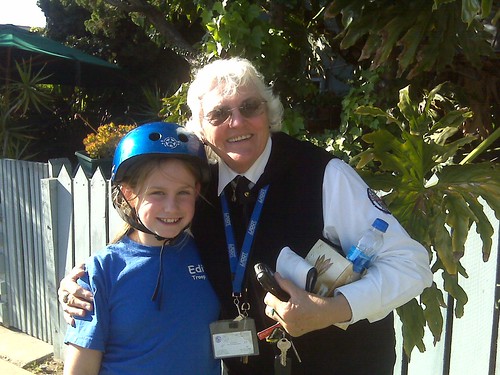Last March, Betty Jolley retired after 32 years as a crossing guard in Venice Beach. Elano Pizzicarola, a student journalist and journalism major at Cal. State Northridge, interviewed Betty and has piece to share.
From Elano Pizzicarola:
What does it take for someone to work as a school crossing guard for
32 years? Elizabeth Jolley, who has just retired from that very job in
Venice Calif., knows the answer. “Dedication, I suppose,” says the
English native, who just turned 76 last March.
She was liked by the whole neighborhood where she worked. The kids
adored her, and their parents trusted her. Many, who had grown
accustomed to seeing her at the corners she worked, had to see her
leave. It was an emotional period they struggled to endure. So when
Jolley was selected to be part of the cut, rumors about her retirement
spread.
“They were very, very disappointed,” says Jolley, who got up from 5:30
a.m. to a quarter to six, never late to her job or absent once.
Parents responded with gifts like chocolates and flowers, bringing
them to Jolley during her last days on the job.
Jolley’s retirement came due to the recession. Last November, the City
of Los Angeles launched a cost-cutting measure, allowing early
retirement to 2,400 of its workers. And as for Jolley, despite her job
giving her “vitality,” she knew she couldn’t work forever. So during
that same month, Jolley, who worked at both Saint Mark School and
Coeur d’Alene Elementary School, took up the offer and applied for the
program. Last February, Jolley found she was finally selected for
retirement.
Despite Jolley wanting to work till the end of the school year, she
was forced to leave on March 12.
“So that was my last day, the twelfth of March,” says Jolley, which is
what she remembers most.
Jolley’s final day yielded a celebration. It garnered local media
attention, as CBS News showed up at the gathering. And at the day’s
end, Core d’Alene granted her a plaque for her work on behalf of the
school and the families of students who went there. “It was, like you
say, ‘I had my fifteen minutes of fame,’” Jolley says.
“It was just a wonderful day.”
Jolley has lived in the same 97-year-old home near Abbot Kinney Blvd.
for 44 years. She has driven the same 1994 Toyota Corolla since its
release.
“I guess it was just the way I was raised, the way I was born,” Jolley says.
In Bradford, England, before Jolley turned 12 when her family moved,
she lived in what she calls a “back-to-back” house, with two living
spaces attached. It was surrounded by bucolic open fields with lambs,
cows and horses.
Jolley family’s living space had two bedrooms, one of which she shared
with her brother, Kenneth. To bathe, she was forced to use a tin
bathtub that was about four feet long, affront a fireplace. To use the
bathroom, she would have to walk to a toilet, outside her house, that
she shared with her neighbors who lived in the house that was
adjacent. To cook, her family would have to use a cast iron device
that she calls a “Yorkshire range,” that served as an oven, grill,
water steamer and heater for her home.
“You walked to the end of the street — there were a row of toilets
back there. You usually shared one toilet with the people that lived
behind you,” says Jolley who happened to live close to the toilets,
shortening her walking distance. During the snowy winters, and
frequent rain, her and her family used what she calls, a “chamber
pot.”
“That’s how people lived in those days, unless you had a house with a
bathroom,” says Jolley, understanding that this lifestyle may seem
foreign to generation X and Y.
At 10, Jolley wrote in a school notebook that she wanted to move to
the Golden State. And by 12, she wrote to the film studios, asking
them to mail her celebrity photos.
Back then, videotapes were nonexistent. So Jolley frequented movie
theaters, as many did in Bradford. When she was 25, she moved to New
Zealand, and worked in the wool mills as many of her peers did.
“We left school and started working straightaway. We never had the
opportunity to go to college,” says Jolley, who began in the office,
but moved on to the mill to earn far more money.
But in 1961, Jolley’s dream to move to California was answered, thanks
to family friends sponsoring her, which she says, is how it was done
back then.
“It wasn’t easy coming to the United States in those days. You had to
go ‘the counsel’ and have a medical exam and a background check-up and
fill all the paperwork out,” says Jolley, who embarked from New
Zealand on the two-week voyage without her family.
“They weren’t too happy. My father was — I think — disappointed.”
Nonetheless, on July 23, 1961, after stops in Honolulu, Vancouver and
San Francisco respectively, a 27-year-old Jolley, aboard the Canberra,
Maiden Voyage, arrived at the Long Beach Port. Her eyes were used to
Bradford’s cleaner air, so they were irritated by the smog before the
ship even docked.
During Jolley’s stay, she first got a job babysitting six children,
for a doctor in Brentwood, where she experienced the 1961 Bel Air
fire. Eventually, she met her future father-in-law, Jack, who used to
be a film projectionist in Santa Monica. Jack introduced Jolley to his
son, who shared his father’s first name. But before they married,
Jolley became homesick and traveled back to Bradford, living back home
for a winter.
Two months later, Jolley returned to Los Angeles and finally married
Jack Jolley in 1963. And ten months after that, Jolley and her husband
Jack, who worked in space exploration, gave birth to her first child.
A doctor noticed that the newlywed’s daughter, Gloria, suffered from
breathing problems. The doctor suggested that Gloria be closer the
ocean, breathing cleaner air. So, in 1966, the family moved from
Palms, Calif. to Venice.
Her husband, who worked in space exploration, had preferred her to be
a stay-at-home mom. But one day in Jan. 1978, one of Jolley’s
neighbors, whom she remembers as “Linda,” had been job hunting. Jolley
noticed an advertorial in Santa Monica’s 123-year-old Evening Outlook
newspaper, which stopped printing in March 1998. Jolley shared the
blurb with “Linda,” but her neighbor declined the offer.
Jolley recognized how this job would be apt for her lifestyle, as she
could work when her children were at school and return home before her
kids, still tending to them, as her husband wanted.
And later that year, after an interview at the Venice Police station
on Culver Blvd. and a visual service exam at Hollywood High school,
Jolley began a 32-year career as a crossing guard at 44-years-old.
Jolley’s first stint was at Broadway Elementary School on Lincoln
Blvd., where she biked from her nearby home. She was trained by a
woman in her late 40s, maybe 50-years-old. Jolley calls her by her
first name, “Rita,” as she is unable to remember her last name.
“And then, I was on my own after that first day.”
When Jolley began her career as a crossing guard, her kids, Erick and
Gloria, would react with excitement. But as the siblings aged, both of
them now working in the entertainment industry, realized the risky
environment their mother worked in and grew concerned.
“They used to say, ‘It’s such a dangerous job, mother. I wish you
didn’t really do it,’” says Jolley, who respond with an affectionate,
cheerful “‘I love doing it,’” her son and daughter, still wary.
“So they day I decided to retire, they were very, very happy – very happy.”
Jolley worked five days a week, sometimes during summer school. She
liked working during summer less than other times, for Jolley
preferred to vacation back in England when school was out.
Six years into her career, Jolley was transferred to Coeur D’Alene
Avenue Elementary School, which was closer to her home, walking to and
from work. She also worked as a crossing guard for Saint Mark
Elementary School, which was about a block and a half away from Coeur
d’Alene. She worked for both schools, corresponding to their end
times.
Today, Jolley, a book-lover, volunteers at the Coeur d’Alene library
on Wednesdays. She helps students check-in their books, reads to them
and stocks the shelves.
“I read books all the time,” says Jolley, who was met, sitting at a
small table in a Studio City Coffee Bean and Tea Leaf, her blue eyes
consumed in Alexandra Ripley’s “Scarlett: The Sequel to Margaret
Mitchell’s ‘Gone with the Wind.’”
And in Venice, sometimes at the library, the parents who trust her and
students who adore her still express nostalgia towards Jolley,
yearning for the time when she was a crossing guard.
Andrew Jenkins, 44, is Coeur d’Alene’s principal. He agrees Jolley
takes the same work ethic from her crossing guard job, to the library.
“She is a dedicated woman in any capacity,” says Jenkins, who was the
one who physically handed her the plaque on that special day of her
retirement.
Jenkins also noticed Jolley at her job site long before her start
time, while balancing her responsibilities of reliability, with
getting to know the students personally. “She was very serious and
very caring,” he says.
Living in Los Angeles, Jolley is still fascinated by the film
industry. But Jolley disassociates herself with many of Los Angeleno’s
needy lifestyle traits of switching residence as income increases,
cars when their trendiness wanes and jobs when better financial
opportunities present themselves. “I’m not that way. I’m British — I’m
English,” Jolley says.
“I like stability. I don’t like to always be moving and changing jobs.”
Jolley does not want much in life besides “peace,” “happiness” and
“contentment,” she says.

























